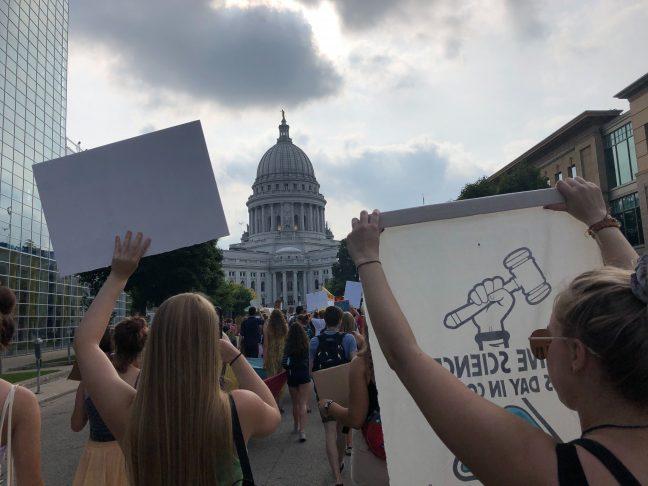The role of increased greenhouse gases produced by humans burning fossil fuels is undeniable. But in the U.S., these dire warnings have not translated into policies that focus on protecting us. In fact, at the federal level, the current administration is determined to roll back what little progress we’ve made.
While the Trump administration pulled the U.S. out of the Paris Climate Accord, states, communities and others across the nation are making commitments to combat climate change. According to the Sierra Club, 140 cities, 12 counties and eight states or territories have made 100% renewable energy goals, and six cities across the U.S. already generate 100% of their energy from clean, non-polluting and renewable sources. All these numbers continue to grow.
With the manufacturing and operating costs of wind turbines, solar panels and energy storage methods continuing to decrease, it is evident renewable energy can replace fossil fuels. The technology is ready, and constant innovation is making it more affordable and efficient. It is no longer a question of if we can transition to renewable energy, but rather a question of how, when and if it occurs soon enough.
Gov. Tony Evers signed an executive order in August to create an Office of Sustainability to help the state to pursue 100% carbon-free electricity by 2050. The City of Madison has also committed to using 100% renewable energy for all city operations by 2030 and for the entire Madison community by 2050.
While all University of Wisconsin schools are entities of the state, and UW-Madison is located in the city of Madison, the university does not reflect the goals made by each larger entity. If a university makes a commitment to expand its use of renewable energy, it has the potential to spur its communities and states into similar action.
It’s clear that as a society we need to move away from fossil fuels to a future with 100% renewable energy. UW-Madison is the state’s flagship university, and is supposedly the center of innovation, research and expertise.
Here, future leaders of industry, government and society are maturing, so why aren’t we setting standards when it comes to the world’s most pressing issue of climate change? It is UW-Madison’s chance to lead the state in this transition to renewable energy.
Earlier this month, the Associated Students of Madison passed a resolution supporting a target goal of 100% renewable electricity by 2030 and 100% total renewable energy by 2050. This resolution called for Chancellor Blank to sign the American College and Presidents’ Carbon or Climate Commitments to ensure UW-Madison is dedicated to transitioning to renewable energy.
UW-Madison has already made some important strides in addressing climate change. In October, UW-Madison received its first Sustainability Tracking, Assessment & Rating System score of silver.
We find ourselves in a typical place after the first round of reports, but we are undoubtedly late to the party. Many schools within the UW System have longer histories of participation in STARS — UW-Stevens Point and UW-River Falls have even received gold ratings. This ranking allows the campus to know where we stand and where improvements need to be made. Our score of 0.06/4.00 in the Clean and Renewable Energy sector shows where much of our focus should be.
Chancellor Blank recently signed the American College and University Presidents’ Resilience Commitment, which focuses on community adaptation to deal with climate change extremes. While this is a step in the right direction, a climate action plan resulting in resilience to climate change is frankly not ambitious enough for a prestigious university like UW-Madison. Yes, our university’s goals need to include improvements in climate resiliency, but they also need to include infrastructure overhauls, like a transition to 100% renewable energy.
A commitment to achieving 100% renewable energy is important because it shows that UW-Madison understands and acknowledges the role it can have in either contributing to or mitigating climate change. With the legacies of John Muir, Gaylord Nelson and Aldo Leopold instilled in UW-Madison students and alumni, we should feel obligated to move entirely away from fossil fuels by making a specific and public commitment to 100% renewable energy by 2050. That means completely clean and renewable electricity, powering electric heating and cooling in our buildings and a university electric vehicle fleet.
Across the country, prominent universities are making commitments to 100% renewable energy, including Cornell University, Hampshire College and Colorado State University. UW-Stevens Point became the first university in the state to have 100% of its electricity come from renewable sources.
UW-Madison should rise to the occasion and make a commitment to 100% renewable energy, too. Doing so will allow our campus to lead the community, state and future generations of Badgers to continue tackling the climate crisis and creating a healthier world for us all.
Parker Eversoll (peversoll@wisc.edu) is a senior majoring in geoscience and environmental studies. He is also a member of Campus Leaders for Environmental Action Now.
CLEAN is helping host a Climate Strike for Renewable Energy Friday, December 6 starting at Library Mall. For more information, please click here.


